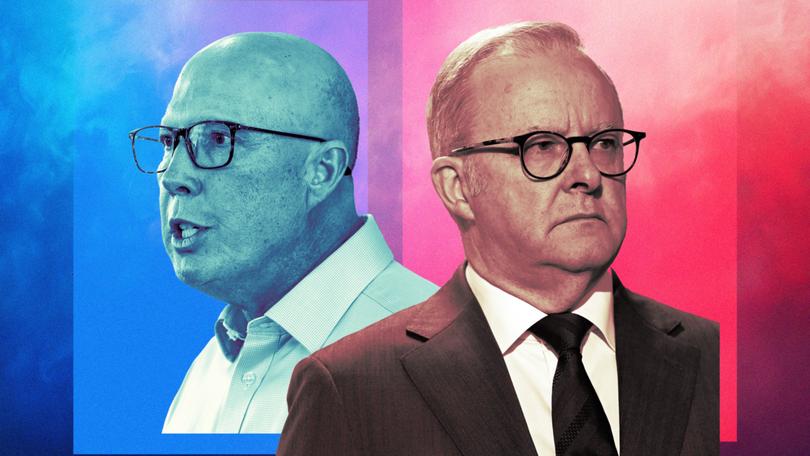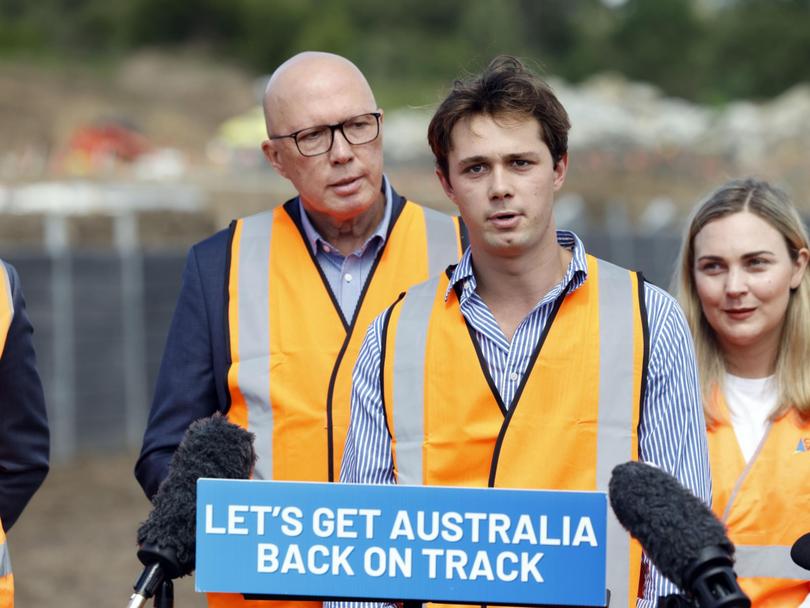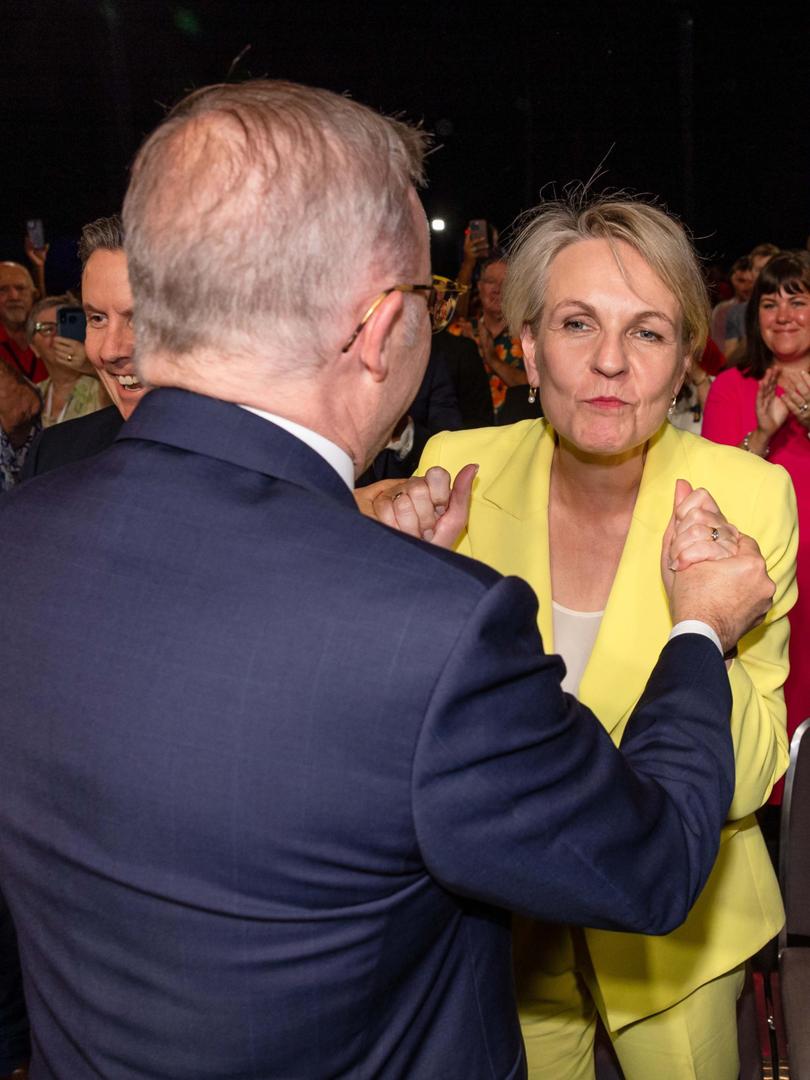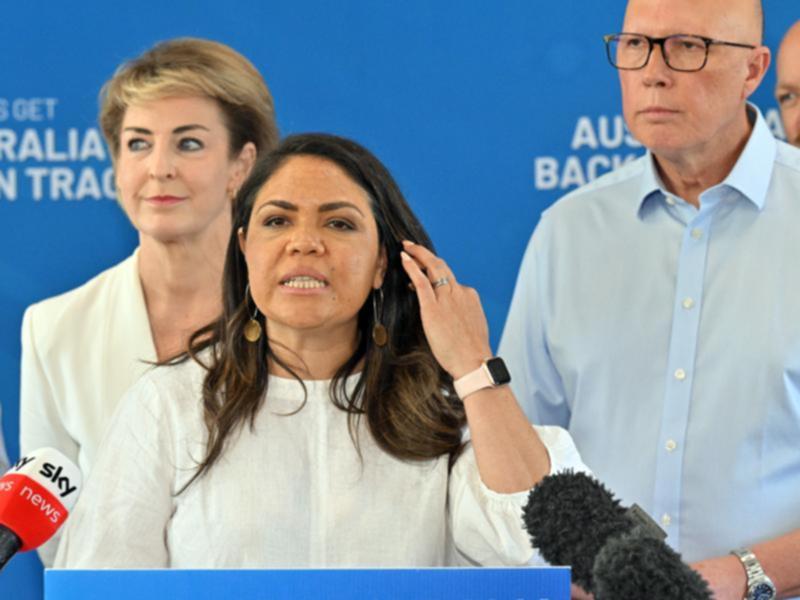AARON PATRICK: Why Peter Dutton is losing the election campaign, and what he can do to turn it around
AARON PATRICK: A better economy, Liberal mistakes and a Medicare scare campaign have flipped the election in Labor’s favour. Here’s what Peter Dutton needs to do to get back in front.

Around the Liberal Party, almost half-way through the campaign, hopes of victory are fading. The mood is downbeat. In some places, verging on panicky.
Liberals follow the polls and betting markets like everyone else, and drew a sharp breath Monday morning when a Newspoll put the Coalition’s support at similar levels to May 2022, when it was swept from power under the leadership of the terrifically unpopular Scott Morrison.
“People are feeling a little deflated,” said a veteran of previous Liberal triumphs. “That’s because expectations got way ahead: this idea at the beginning of the year that we were going to somehow win was wrong.”
Sign up to The Nightly's newsletters.
Get the first look at the digital newspaper, curated daily stories and breaking headlines delivered to your inbox.
By continuing you agree to our Terms and Privacy Policy.
Most polls estimate national support, making it difficult to translate them into expected seats. But the chances of the government retaining its slim parliamentary majority, an outcome that seemed fanciful at the start of the year, rose from 13 per cent to 27 per cent over the past three weeks, according to betting markets.
An absolute Labor victory would be devastating for Liberal leader Peter Dutton, who party insiders believe is counting on a hung Parliament to force Prime Minister Anthony Albanese into a unwieldy and unpredictable quasi-coalition with independent MPs financed by climate activist Simon Holmes à Court. Years of messy parliamentary horse-trading, they say, would place Mr Dutton in a strong position to win the subsequent election.
Good timing
The turnaround in the Coalition’s fortunes appears driven by four forces: slowing inflation, simple mistakes, Donald Trump and a great Labor scare campaign.
Over Labor’s entire three years of government, inflation has been the opposition’s top criticism. Mr Dutton and Treasury spokesman Angus Taylor still cite living standards and cost-of-living pressures in every interview.
While most Australians suffered a fall in living standards under the Labor Party, though, the sense of pessimism is lifting at the most advantageous time for the government: annual inflation was only 2.4 per cent in February, interest rates are heading lower, consumer confidence is up.

Miss-speaking
Unlike the prime minister, Mr Dutton is usually a disciplined speaker. But on the third day of the campaign, he made a mistake. During a friendly interview on the KIIS radio station with presenters Kyle and Jackie O, he revealed that he and wife Kirilly intended to live in the prime minister’s Sydney residence if elected.
“You’ve got a choice between Kirribilli or living in Canberra in The Lodge and I think you’d take Sydney any day over Canberra,” he said.
Liberals with public relations experienced cringed when they heard the comment, which left Mr Dutton exposed to allegations he was thinking about the perks of office while complaining about working families’ tough lives. Labor ministers pounded him mercilessly.
He was not the only one to trip up. In Tasmania, the candidate for Lyons, Susie Bower, hedged when asked if some Medicare clinics would continue to be free under the Coalition. They would, but she was not sure. The prevarication was used in a national advertising campaign by Labor, reinforcing repeated claims by Mr Albanese and other ministers the Coalition would cut Medicare spending to pay for nuclear power plants.
No matter how often Coalition MPs denied the claim — they promised to spend more than Labor on Medicare — the allegations continued, suggesting Labor polling found they were working.
Trump factor
Other Liberals got into trouble too. Amelia Hamer, the candidate for Kooyong in Melbourne who presented herself as a renter, was revealed to own two homes. Benjamin Britton was removed from the contest in Whitlam, a Sydney seat, for a pre-election comment opposing women in military combat roles, a similar view to that expressed by the Coalition’s defence spokesman, former SAS officer Andrew Hastie. The ban on women in combat was dropped in 2013.
Both stories distracted from Mr Dutton’s main campaign message that his team has the competence to lead the country through a difficult time, domestically and internationally.
Then on Saturday, the Coalition’s Indigenous Affairs spokeswoman and designated “Minister for Government Efficiency”, Jacinta Price, used a Trump-like phrase — “we can make Australia great again” — which triggered another burst of critical coverage.

After launching a global trade war with allies and others, the US president has become a toxic association for conservative populists around the world. In Canada, which will hold an election a week before Australia’s, support for the Liberal Party’s counterpart has gone from a 25-percentage point lead to a nine point deficit.
Whenever it can, Labor associates Mr Dutton with Mr Trump. When the Liberal leader promised at his campaign launch Sunday to stop students being indoctrinated at school — some public primary schools have begun teaching the national anthem in the local Indigenous language — Education Minister Jason Clare accused him of a “cut and paste from the United States”.
In addition to the political similarities between the two men — both are suspicious of conventional economics — the general angst created by an unpredictable America is likely influencing Australian voters.
“I think it has been of great advantage to the Labor Party,” said Roy Morgan Research chief executive Michele Levine. “The party in office is always advantaged when something happens that really challenges the status quo.”
On Tuesday morning two Nine newspapers published a poll that estimated 35 per cent of uncommitted voters are less likely to vote for the Coalition because of Mr Trump.
What now?
Former and current Liberal officials say Mr Dutton does not have any obvious options to reverse the slide. Any shift of emphasis away from inflation, housing, immigration or defence may confuse voters and create the impression the Coalition is devising a plan for government at the last moment.
The opposition needs to wait for big policies announced at the Liberal campaign, including Mr Dutton’s offer to make mortgage interest payments a tax deduction for some borrowers, to reach most voters through the media and advertising. Voting will begin in a week’s time. Any policies launched later will influence fewer votes.
Mr Albanese, who can become prickly under hostile questioning, may slip up too. Liberals like to cite the last election campaign, when they say his best week was when he had to isolate after contracting COVID-19.
“The numbers are still tight,” one former senior Liberal adviser said. “Half the country will soon be on holidays. School holidays may change their feelings about inflation, with kids at home and going to Easter shows.”
One Liberal MP said even the residents in the wealthiest part of his urban electorate are feeling financial pain.
“The number of people who bring up their energy bills is astronomical,” he said. “We just need to keep reminding voters that they are worse off after the last three years in large part because of decisions taken by this government.”

